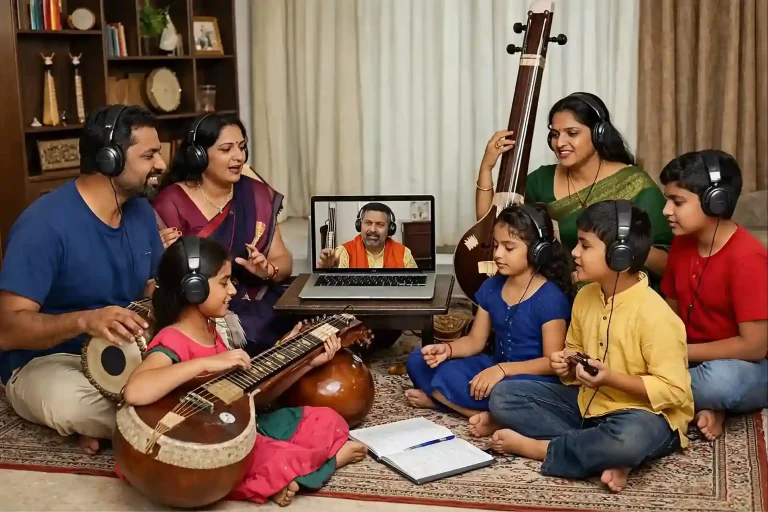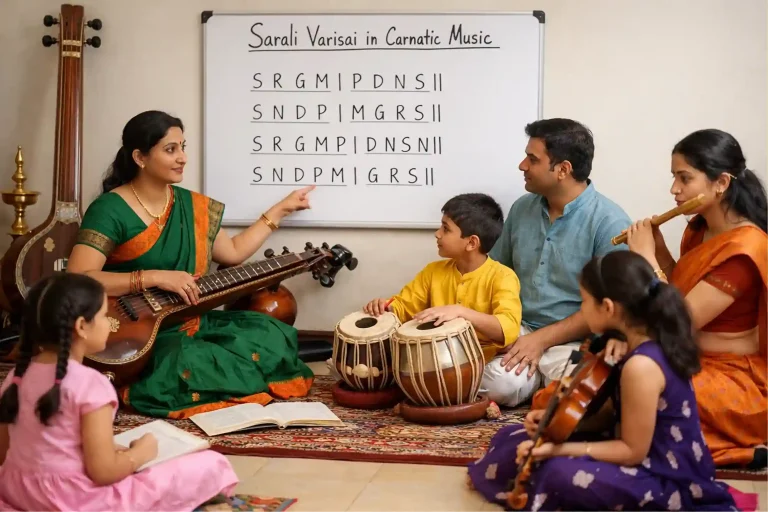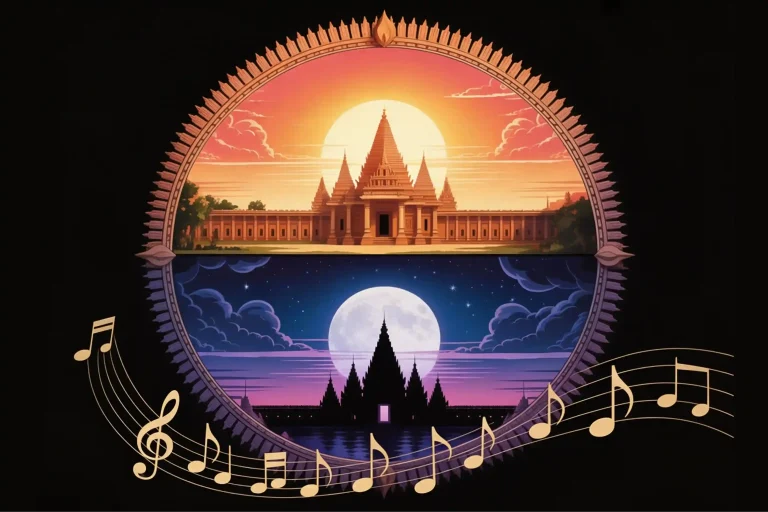All Topics
- Alchemizing Music Concepts for Students
- Artist Spotlight
- artium gift card
- Artium Maestros
- Artium News
- buying guide
- Carnatic Music
- Devotional Music
- Editorials by Ananth Vaidyanathan
- Film Music
- Guitar
- Hindustani Classical Music
- Indian Classical Music
- Indian Folk Music
- Insights
- Instruments
- Karaoke Singing
- Keyboard
- Kids Music
- maestros
- Music Education
- Music for Kids
- Music Industry
- Music Instruments
- Music Legends
- Music Theory
- Music Therapy
- Piano
- piano guide
- Success Stories
- Tamil Film Music
- Telugu Film Music
- Time Theory
- Tools
- Uncategorized
- Vocal Singing
- Vocals
- western classical music
- western music
- Western vocal music
Carnatic Music, Indian Classical Music
5 Iconic Indian Classical Singers Who Inspire Modern Music Learners
5 Iconic Indian Classical Singers Who Inspire Modern Music Learners
Table of Contents
Indian classical music has existed for centuries. It is a musical art form, a spiritual journey, and a meditative practice passed down to generations. For many Indian classical singers, this is a lifelong pursuit of melody and meaning. With roots that trace back thousands of years, both Hindustani and Carnatic classical music traditions have gifted India with timeless musical treasures.
With the rise in popularity of online music learning, a new generation of classical music singers are discovering the magic of ragas, taans, and kritis. So, if you are an aspiring singer seeking inspiration on what to listen to, look no further. Many legendary classical singers continue to inspire the new generation of aspirants.
This guide will explore our top 5 Indian classical singers, who continue to inspire musicians worldwide.
Aruna Sairam – Bridging Tradition with Modern Expression

Aruna Sairam is one of the most celebrated Carnatic classical singers in the world today. Her deeply rooted traditional Carnatic style resonates across age groups and cultures. Whether she sings a Tyagaraja kriti or a Tamil folk-inspired song, her voice makes her music feel personal and alive. She is one of those pioneer singers who took Carnatic classical music to the global stage with her performances at the Royal Albert Hall in London and the Théâtre de la Ville in Paris.
Signature pieces:
- Maadu Meikkum Kanne
- Rangapura Vihara
- Bhavayami Gopalabalam
How does she inspire?
She is more than just a world-renowned Carnatic singer. She is also a mentor, a path-maker, and an innovator. After spending years putting India on the world map with her singing, today she’s inspiring the next generation of singers through her experience.
She leads Artium Academy’s Carnatic classical music course through structured and certified programs. She inspires learners by proving that tradition is not static—something to be lived, loved, and passed on with creativity and commitment.
Shubha Mudgal – The Modern Face of Hindustani Classical

Shubha Mudgal is among the most celebrated names in Hindustani classical music. She is one of those Indian classical singers known for her powerful voice, fearless experimentation and unwavering commitment to the art. Her repertoire spans khayals, thumris, dadras, bhajans, and contemporary fusion.
Besides being a Hindustani classical singer, Shubha Mudgal is also known for popularising semi-classical and indie sounds to appeal to younger audiences. Her famous track “Ab Ke Sawan,” a monsoon anthem, is a brilliant example of how classical influences can blend seamlessly into mainstream music without losing their soul.
Signature pieces:
- Ab Ke Sawan
- Ali More Angana
- Mann Ke Manjeere
How does she inspire?
Apart from being a performer, Shubha Mudgal has been instrumental in promoting music with meaning. She is the faculty head for Hindustani classical music at Artium Academy, playing an important role in shaping the next generation of Indian classical singers.
Her teaching style is as grounded as her music—humble, encouraging, and deeply rooted in tradition. Whether you’re a teenager discovering raags or a parent reviving your passion for music, her work proves that classical music is for everyone.
M.S. Subbulakshmi – The Queen of Bhakti and Carnatic Classical Music

M.S. Subbulakshmi is one of the most renowned names in Carnatic classical music. She was not just another classical vocalist but a “phenomenon”. She sang every note with devotion and conviction that it often left her listeners in tears. Born in Madurai in 1916, she was a prodigy who recorded her first song at just 10 years old and became the first musician ever to be awarded the Bharat Ratna, India’s highest civilian honour. M.S. Subbulakshmi’s legacy is not confined to India alone.
She is the first Indian classical singer to perform at the United Nations in 1966. Her performance of “Maithreem Bhajata”, composed by the Kanchi Paramacharya, carried a message of universal peace and harmony—resonating globally even today.
Subbulakshmi was renowned for her renditions of Tyagaraja kritis, bhajans, and Sankrit slokas. Her legendary recording of “Sri Venkatesa Suprabhatam” still wakes up millions of Indians across South India.
Signature pieces:
- Bhaja Govindam
- Venkatesa Suprabhatam
- Kurai Ondrum Illai
- Vishnu Sahasranamam
How does she inspire?
Her humility, discipline, and dedication to her art form make her a role model. Learners, even today, sing her compositions for technical clarity and spiritual depth. Her life proves classical music can be a vehicle for devotion, discipline, and cultural diplomacy.
Pandit Bhimsen Joshi – The Voice of the Kirana Gharana

Pandit Bhimsen Joshi has one of those soul-awakening voices. He’s one of the most prominent Hindustani classical singers from the Kirana Gharana, which is known for its perfect pitch, elaborate alaaps, and slow meditative progression of ragas. Born in 1922, Bhimsen Joshi started learning music very young. Legend has it that he ran away from home at 11, travelling across India in search of a guru.
His style blended discipline with unrestrained emotion. While his khayal renditions in ragas like Bhairavi, Miyan ki Todi, and Puriya Dhanashree showcased his unmatched control and depth, his bhajans—like “Jo Bhaje Hari Ko Sada” and “Bhagyada Lakshmi Baramma”—reflected his intense spiritual connection with music.
He was among the few classical musicians to become a household name in India thanks to his iconic participation in the national integration song “Mile Sur Mera Tumhara”, where his powerful opening lines still echo in every Indian heart.
Signature pieces:
- Raag Bhairavi (live performances were legendary)
- Jo Bhaje Hari Ko Sada
- Mile Sur Mera Tumhara
How does he inspire?
His singing was more about feeling, devotion, and spontaneity than technical mastery. His teachings emphasized that the voice is not just an instrument but a carrier of emotions. His powerful taans, meends, and ability to hold a single note and fill it with layers of expression make him a benchmark for every serious student of Hindustani classical music today.
Ustad Bade Ghulam Ali Khan

Born in 1902 in Kasur (now in Pakistan), Ustad Bade Ghulam Ali Khan is widely considered one of the legendary figures in Hindustani classical music. Hailing from the Patiala Gharana, he trained under his father, Ali Baksh Khan, who nurtured his exceptional range, technical brilliance, and soul-stirring expression.
This gave his voice a magical texture, warm, fluid, and effortlessly agile across octaves. He was one of those rare artists who could blend lightning-fast taans with profound emotional expressions. Even today, music aspirants worldwide look up to his renditions of ragas Malkauns, Darbari, and Rageshree for inspiration. What made his gayaki unique was the seamless ornamentation of notes and an emotional intensity that brought audiences to tears.
Apart from bringing artistry to the classical stage, he also applied his skills in Indian cinema. He lent his voice to an unforgettable piece, “Prem Jogan Ban Ke” in Mughal-e-Azam (1960), proving that classical music could thrive in popular formats without losing its soul.
Signature Pieces:
- Prem Jogan Ban Ke (from Mughal-e-Azam)
- Yaad Piya Ki Aaye
- Raga Darbari Kanada
How does he inspire?
His life exemplified how musical mastery can be achieved with precision and passion. Despite hardships, he remained committed to excellence and practice. Modern learners draw inspiration from his discipline, vocal agility, and emotional richness, which he infused into every performance. His music reminds us that classical music is more than just technical; it is deeply human.
Honorable Mentions: Voices That Echo Through Time
Tyagaraja: Even after centuries, Tyagaraja remains the beating heart of Carnatic music. For modern learners, his music offers melodic depth and serves as a blueprint for emotional expression, devotion, and discipline.

T.M. Krishna: Known for challenging norms, he continues to innovate within the Carnatic tradition while pushing for social change.

Kishori Amonkar: A towering figure in the Jaipur-Atrauli gharana, she brought emotional depth to every raga she touched.

Rashid Khan: A modern-day Hindustani vocalist with an extraordinary voice and mastery, often hailed as one of the greatest voices today.

Lalgudi Jayaraman: A violin virtuoso and composer whose thillanas and kritis are staples in every Carnatic concert.

Artium Academy – An Ideal Place to Learn Indian Classical Singing
When we started Artium Academy, we were committed to spreading the real essence of Indian classical music to aspirants worldwide. The legendary Aruna Sairam and Shubha Mudgal lead our classical music programs, Carnatic and Hindustani.
What makes us different?
- Live 1:1 interactive sessions with trained mentors
- GRMP-certified programs that provide global recognition for your musical journey
- Smart dashboards and feedback tools to track progress
- Regular showcases and recitals to build performance confidence
Whether you’re a beginner, an aspirant preparing for concerts, or someone reconnecting with your roots, Artium Academy offers a path that blends classical tradition with modern learning tools.
Final Thoughts: Let the Legends Lead Your Journey
Indian classical music is a timeless art form. These singers are more than just artists. They are the driving force behind inspiring millions of aspirants worldwide.
Whether it’s the devotional power of Tyagaraja kritis, the discipline of M.S. Subbulakshmi’s voice, or the fearless modernity of Shubha Mudgal, there’s inspiration waiting for every learner. These singers have proven that Indian classical music is not bound by time or geography. It evolves, grows, and flourishes with each new voice that dares to learn.
At Artium Academy, we honour these legends by keeping their teachings alive and relevant for today’s generation. With the right mentors, the right platform, and a commitment to learning, your journey into Indian classical music can be as enriching as the melodies you aspire to master.
Book a Free Trial at Artium Academy and begin your classical music journey today.
FAQs on Indian Classical Singers
There’s no single answer, but many consider M.S. Subbulakshmi, Pandit Bhimsen Joshi, and Tyagaraja as pillars of Indian classical music. Each has left an irreplaceable mark through their voice, compositions, and cultural influence.
Carnatic music is predominantly practiced in South India and is known for its krithis and ragam-tanam-pallavi formats. Hindustani music, popular in North India, emphasizes improvisation and forms like khayal, thumri, and dhrupad.
Absolutely! Platforms like our’s offer structured 1:1 online classes, certified curricula, and world-class mentors like Shubha Mudgal and Aruna Sairam to help beginners and advanced learners alike.
Tyagaraja composed over 700 devotional kritis, many of which are still sung in concerts today. His compositions express deep bhakti and musical brilliance, forming the core curriculum for Carnatic music students across generations.
Artium Academy offers GRMP-certified programs in Carnatic and Hindustani classical music, designed by legends themselves. Students benefit from live 1:1 sessions, smart feedback tools, and performance showcases, making learning accessible and personalised from anywhere in the world.








